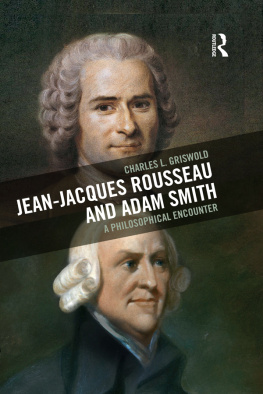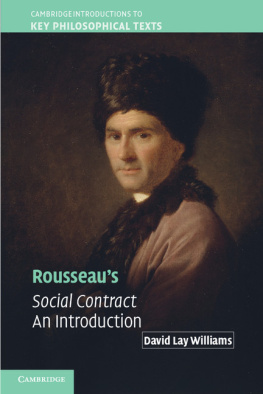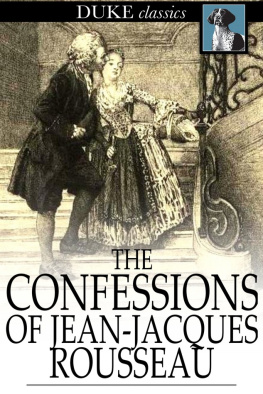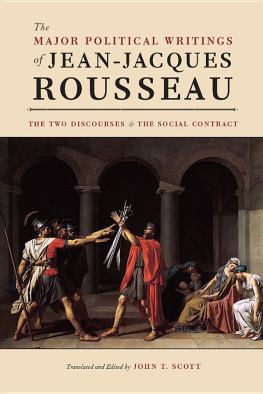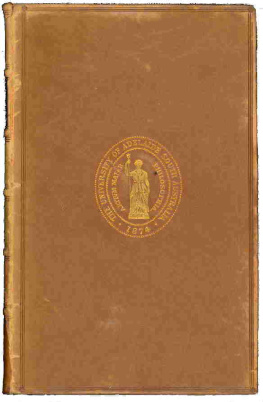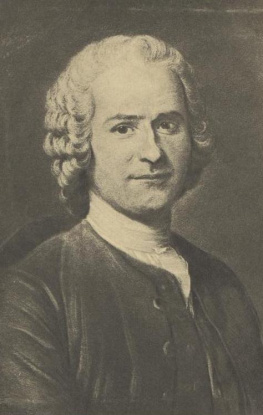ROUSSEAU AND WEBER
Two Studies in the Theory of Legitimacy
J. G. MERQUIOR
First published in 1994
Reprinted in 2006 by
Routledge
2 Park Square, Milton Park, Abingdon, Oxfordshire, OX14 4RN
270 Madison Avenue, New York NY 10016
Routledge is an imprint of Taylor & Francis Group, an informa business
First issued in paperback 2010
1984 J. G. Merquior
All rights reserved. No part of this book may be reprinted or reproduced or utilized in any form or by any electronic, mechanical, or other means, now known or hereafter invented, including photocopying and recording, or in any information storage or retrieval system, without permission in writing from the publishers.
The publishers have made every effort to contact authors and copyright holders of the works reprinted in the Weber series. This has not been possible in every case, however, and we would welcome correspondence from those individuals or organisations we have been unable to trace.
These reprints are taken from original copies of each book. In many cases the condition of these originals is not perfect. The publisher has gone to great lengths to ensure the quality of these reprints, but wishes to point out that certain characteristics of the original copies will, of necessity, be apparent in reprints thereof.
British Library Cataloguing in Publication Data
A CIP catalogue record for this book
is available from the British Library
Rousseau and Weber
ISBN 13: 978-0-415-40210-1 (set)
ISBN 13: 978-0-415-40217-0 (volume) (hbk)
ISBN 13: 978-0-415-61110-7 (pbk)
Routledge Library Editions: Weber
Rousseau and Weber
Two studies in the theory of legitimacy
J. G. Merquior
First published in 1980
by Routledge
2 Park Square, Milton Park, Abingdon, Oxon, OX14 4RN
270 Madison Ave, New York NY 10016
J. G. Merquior 1980
No part of this book may be reproduced in any form without permission from the publisher, except for the quotation of brief passages in criticism
British Library Cataloguing in Publication Data
Merquior, J G
Rousseau and Weber. (International library of sociology).
1. Rousseau, Jean-Jacques Political science
2. Weber, Max
3. Legitimacy of governments
I. Title II. Series
320.01 JC179.R9
ISBN 0 7100 0513 X
For H.
Being unable to make what is just strong, we have made what is strong just.
Pascal
Unanimity is almost always an indication of servitude.
Charles de Rmusat
Nor in the critic let the man be lost.
Pope
Acknowledgments
A slightly different version of the following studies was presented as a PhD thesis at the London School of Economics and Political Science, where they have greatly benefited from the critical supervision of Professor Ernest Gellner and also from the comments of the external examiner, Geoffrey Hawthorn, from Cambridge. On the other hand, as part and parcel of an ongoing research on the theory and history of legitimacy concepts, this work has been the subject of constant if intermittent exchanges of ideas with a number of friends: Afonso Arinos de Melo Franco, Alberto da Costa e Silva, Arnaldo Carrilho, Celso Lafer, Claude Lvi-Strauss, Ernst Topitsch, Evaldo Cabral de Mello, Fernando Henrique Cardoso, Gabriel Cohn, Gilberto Freyre, Heloisa Vilhena de Araujo, Jos Francisco Rezek, Jos Jeronimo M. de Souza, Jean-Marie Ben-oist, Kenneth Minogue, Leandro Konder, Leszek Kolakowski, Lucio Colletti, Luiz Navarro de Brito, Marcilio Marques Moreira, Perry Anderson, Raymond Aron, Roberto de Oliveira Campos (who generously encouraged the perpetration of this book), Roberto Mangabeira Unger, Roberto Schwarz, Raphael Valentino Sobrinho, Sergio P. Rouanet, Shirley Robin Letwin . Needless to say, none of them can be responsible for my views on our two heroes. By far the main victim of my obsession with legitimacy, however, has been my wife. I wonder how much of her personal partiality towards Jean-Jacques (as against Max) is reflected in what follows. I should also like to thank the libraries of the LSE and of Kings College, London, Mr Eloi Rosa and a wonderful librarian, Miss Ophelia Vesentini, for their prompt help in gathering the literature without which these pages could never have been written. Finally, I am very grateful to Peter Hopkins, of Routledge & Kegan Paul, and to the director of the International Library of Sociology, Professor John Rex, for their welcome to this book, as well as to Julia Warner, for the competence and friendly solicitude with which she edited it.
J. G. M.
London, October 1979
Introduction
The Problem of Legitimacy in Social Theory
I Rousseau and Weber as Typical Theorists of Legitimacy
This book is chiefly an attempt to describe and assess the theory of legitimacy at two distinct stages and levels of social theory: the political philosophy of Jean-Jacques Rousseau (171278) and the sociology of Max Weber (18641920).
There seems to be general agreement as to the fact that the problem of legitimacy figures at the very heart of our concern with the nature and value of modern society. Being as it is a main dimension of political culture the dimension where the validity of power forms is at stake legitimacy has indeed become a key issue in contemporary social theory. We propose to make a contribution to the history of its conceptual realization by scrutinizing the work of two thinkers usually reckoned to be at the forefront of social theory, and, within the latter, as the two most influential classics of an explicit analysis of legitimacy.
Rousseau and Weber are as different in spirit as they are distant in time. Therefore, the present book is actually composed of two quite separate studies, only tangentially connected. Nevertheless, the very contrast between our two theorists yields a fairly illuminating perspective on the concept of legitimacy. Indeed, each of them might very well be taken as the supreme representative, the archetype, so to speak, of one of two basic ways of looking at the phenomenon of legitimacy: that which views it in terms of belief, and that which sees it in terms of power. While Jean-Jacques Rousseau was the main founder of what we might call the power theory of legitimacy, Max Weber remains the locus clas-sicus of the belief theory of legitimacy. But this distinction calls for some elaboration; in order fully to understand its import, we must cast a glance at the mainlines of the history of the concept of legitimacy, both long before Rousseau and after Weber.
II The Concept of Legitimacy: Norm- and Power-Legitimacy
The cradle of legitimacy theory was legal philosophy. In Classical Latin legitimus meant just lawful, according to law. Cicero employs the expressions legitimum imperium, potestas legitima when referring to power and magistrates lawfully established. The De Officiis (III, 108) distinguishes the legitimate enemy (legitimus hostis) from the robber or pirate, because treaties are signed with the first, and they are law-like documents. Apparently, ancient Greek did not possess a special word for legitimate (as distinct from lawful) either.



